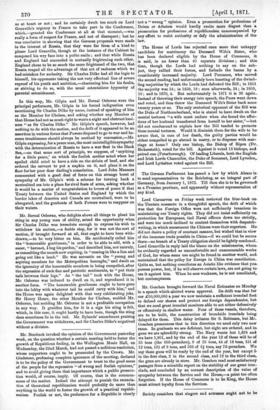The House of Lords has rejected once more that unhappy
candidate for matrimony the Deceased Wife's Sister, who- has been declared eligible by the House of Commons, it is said, in no fewer than 40 separate divisions ; and this. time, though the Lords had nothing to say on the sub- ject, they rallied their forces, and forbade the banns by a. considerably increased majority. Lord Penzance, who moved. the second reading, had unfortunately been boasting of the dwind- ling majorities by which the Lords had defeated the Bill ; in 1851 the majority was 34; in 1858, 19; soon afterwards, 24; in 1859, 10; and in 1870, 4. But unfortunately in 1871 it is 26 again. Insteadof throwing their energy into speech, the Peers went down. and voted, and thus threw the Deceased Wife's Sister back some- twenty years or so. The only oratorical opponent of the Bill was the Duke of Northumberland, who is stated to have dwelt on the- mental tortures "a wife must endure when she found the affec- tions of her husband transferred from herself to her sister,"—but did not condescend to explain how the Bill tended to promote these mental tortures. Would it diminish them for the wife to be- ware that, in case of her death, the guilty parties would be- either compelled to go abroad to marry, or to dispense with mar- riage at home ? Only one bishop, the Bishop of Ripon (Dr_ Bickersteth), voted for the bill. Against it voted 13 bishops, and paired one (Peterborough). Of leading Liberals, both the English. and Irish Lords Chancellor, the Duke of Somerset, Lord Lyveden,_ and Lord Lyttelton voted against the Bill.
































 Previous page
Previous page